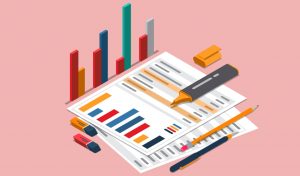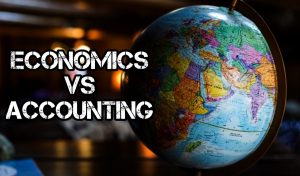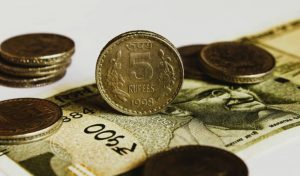Accounting and Economics, Which is Better?: Many considerations go into deciding whether economics or accounting is the superior course of study. Both are excellent selections for aspiring business professionals because they deal with business and numbers. However, the collection of skills you’ll acquire will be extremely different.
Accounting is a technical discipline that emphasizes facts over theories. Financial reports and audits are used to deal with the movement of money, taxation, and keeping accurate records. Economics, on the other hand, is concerned with human resource behaviours. And the theories that underpin people’s judgments about money, raw commodities, land, and labour.
So, while accounting focuses on the smaller points, economics is all about looking at the broad picture. Which is best for you will be determined by your preferred work style and where you see your career going. In addition, the level of certainty you desire for your voyage. To help you make an informed selection, we compare key essential characteristics in both disciplines.
RECOMMENDED: Countries with the best education system in the world
Accounting: definition
An accountant’s responsibilities include analysing and recording all of the company’s financial activities, as well as reporting on them. Partners can determine if they want to form partnerships using enterprise accounting.

The accounting department records all business transactions, including debit and credit accounting. The management assesses the company’s financial status and can make key decisions based on the reports.
Economics: definition
Economics is a branch of science that analyses the creation, exchange, allocation, and consumption of diverse resources and services around the world. Economists research the economy’s structure and help the government of a country develop a broad economic strategy in respect to other countries and their populations. They also forecast economic indicators in a variety of resource exploitation and consumption areas.

Specialists employed by the corporation execute the same functions, but exclusively in respect to other businesses, internal funds, and resources. Microeconomics and macroeconomics are two economic branches. Macroeconomics aims to investigate the internal economic system, specifically its inflation and efficiency. Microeconomics, on the other hand, is the study of resource allocation.

Also see: Best business schools in Canada 2021
Accounting and Economics, Which is Better? Answered
In answering this question, we are going to be comparing Accounting and Economics under different heads:
1. Curriculum
Even though economics classes are commonly found at business institutions, the discipline is classified as a social science. This is because it focuses on how individuals deal with resource shortages. Macroeconomics and microeconomics, including other subfields of the area, will be covered during your study. Macroeconomics studies economies on a global or regional scale, as well as how they function.
In comparison to accounting, it is a much larger, philosophical subject of study with fewer specializations. Typical topics covered in class include trade and financial theory, game theory, government policy, and the labour force. Following that, you’ll have a thorough perspective on issues ranging from business to art and government. You will, however, obtain a lower level of technical knowledge.

Contrarily, accounting is concerned with the economic and management aspects of the business. But just those relating to company operations and performance evaluation. You’ll learn how to keep track of company transactions in the most efficient way possible. In addition, how to produce financial statements for a company’s assets, liabilities, and operational performance. Financial reporting, taxation, and auditing concepts and procedures will be covered. Also, practice using these ideas, such as producing balance sheets and tax forms, to improve your technical expertise.
Also see: Best commercial courses to study in the university
2. Skills for your CV
Economics courses will teach you how to use economic concepts and models in a variety of circumstances. You’ll also learn about the major dynamics that influence social policy and financial markets. Also, be able to analyse statistical data. Aside from that, you’ll get the following transferrable skills:
a. How to present and explain complicated data and results
b. Ability to work with large amounts of data and use both mathematical and statistical approaches to analyse it
c. Solving problems through analysing data, generating findings, and making suggestions
d. Using specialized computer applications, you may improve your tech abilities.
e. How to manage your time so that you can complete activities within the allotted time?
f. Analytical abilities gained via the examination of research methodologies, data, results, and suggestions.
An accounting education, on the other hand, will teach you about accounting procedures, trade, industry, and money. Aside from your technical accounting abilities, you’ll get the following transferable skills:
a. The capacity to persuade and persuade others
b. A detailed grasp of corporate structures and operations is required.
C. Mathematical and quantitative abilities
d. Problem-solving skills and the capacity to analyse data
e. Communication abilities, both oral and written
f. Working knowledge of global business concerns
g. How to Become a Successful Entrepreneur
Recommended: Advantages and Disadvantages of a written constitution
3. Job Market
The majority of accounting students go on to become accountants and achieve chartered status. Though some pursue careers in sectors such as accounting or finance. Accountants have a lot of options in the employment market. It’s one of the most in-demand finance positions in the UK right now, with 80,000 more accountants required by 2050.
Students studying economics will have a less well-defined path ahead of them. Working in finance, accounting, or government departments may be possible if you study social policy and financial markets. However, certain organizations may need postgraduate credentials for economist positions.
Many occupations might benefit from your capabilities; all you have to do is conduct some research and match your ability to the position. Many economics students end up working in the accounting field. Once hired, taking professional tests to obtain the necessary technical expertise.
Compliance officer, data analyst, financial risk analyst, statistician, and external auditor are some of the other occupations available to economics graduates.
RECOMMENDED: Best science courses in the university
4. A Defined Career Path
Accounting, once again, benefits from pretty well-defined career paths. With additional study and passing professional tests, you can achieve senior jobs in any branch of accounting. You might pursue postgraduate level credentials to become an expert in your field in addition to becoming a chartered accountant.
Because economics students’ professional pathways are less well-defined, determining their advancement options is difficult. There are a variety of positions you may take on that can lead to successful career paths. However, most students discover their preferred path throughout their education. Once they’ve gotten a feel for the job, they can look into other options.
If you want to pursue specialized fields after graduation, such as the financial business, you can do so at the postgraduate level. Getting a master’s degree in actuarial science or a doctorate in a specialized field of finance, such as banking or trade statistics. This would once again position you as an expert, making you more appealing to companies.
5. Wage
According to Indeed Salaries, an accountant’s average yearly earnings in the United States are $55,668, whereas an economist’s average annual wages are $106,721. Salary is determined by the location of employment, the role held, and the abilities possessed. Benefits, such as mileage reimbursement, health insurance, vacation, and other perks, are available to employees in both professions.
RECOMMENDED: Difference between wage and salary explained
Conclusion
Although both economics and accounting deal with money and business, they are two distinct sciences. Consider studying economics if you love looking at the broad picture and analysing trends in behaviour, cause and effect. You may choose to concentrate on the finer points, painstakingly categorizing and organizing everything into a flawless system.
You’ll probably love accounting if that’s the case. Before enrolling in either course, think about these principles as well as your strengths and shortcomings. Accounting can help you get work soon after graduation. While economics provides the foundation for understanding politics, money, and decision-making, it is not required. Assisting you in a variety of jobs and allowing you more freedom to change careers later on.

Edeh Samuel Chukwuemeka, ACMC, is a lawyer and a certified mediator/conciliator in Nigeria. He is also a developer with knowledge in various programming languages. Samuel is determined to leverage his skills in technology, SEO, and legal practice to revolutionize the legal profession worldwide by creating web and mobile applications that simplify legal research. Sam is also passionate about educating and providing valuable information to people.